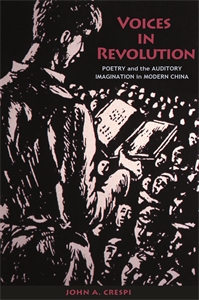Voices in Revolution: Poetry and the Auditory Imagination in Modern China
On Sale!- About the Book
-
China’s century of revolutionary change has been heard as much as seen, and nowhere is this more evident than in an auditory history of the modern Chinese poem. From Lu Xun’s seminal writings on literature to a recitation renaissance in urban centers today, poetics meets politics in the sounding voice of poetry. Supported throughout by vivid narration and accessible analysis, Voices in Revolution offers a literary history of modern China that makes the case for the importance of the auditory dimension of poetry in national, revolutionary, and postsocialist culture.
Crespi brings the past to life by first examining the ideological changes to poetic voice during China’s early twentieth-century transition from empire to nation. He then traces the emergence of the spoken poem from the May Fourth period to the present, including its mobilization during the Anti-Japanese War, its incorporation into the student protest repertoire during China’s civil war, its role as a conflicted voice of Mao-era revolutionary passion, and finally its current adaptation to the cultural life of China’s party-guided market economy.
Voices in Revolution alters the way we read by moving poems off the page and into the real time and space of literary activity. To all readers it offers an accessible yet conceptually fresh and often dramatic narration of China’s modern literary experience. Specialists will appreciate the book’s inclusion of noncanonical texts as well as its innovative interdisciplinary approach.
- About the Author(s)
-
John A. Crespi, Author
- Reviews and Endorsements
-
"This brilliantly researched and thoughtfully considered book certainly opens many doors to future research." —China Review International (16:1, 2009)"An excellent introduction to the topic of the auditory dimensions of modern and contemporary Chinese poetry." —The China Quarterly (June 2010)
"This is an important and exciting monograph for the field of modern Chinese literature. It sheds unprecedented light on poetic composition and does much more than previous studies to flesh out the living practice of poetry circulation and reception in modern China." —Charles Laughlin, Tsinghua University, Beijing
"Crespi convincingly argues that the questions of how to give voice to modern poetry and how to communicate poetic work to the wider public lie at the heart of modern Chinese poetics. Consequently, recitation was an issue for poets of all persuasions, not just for those interested in political activism. And even those who pursued political agitation, such as the wartime poets, are shown to have performed much more often for smaller in-house audiences than for the large crowds that they hoped to address. Attempts to turn modern poetry into spontaneous on-stage outbursts of unaffected yet affective emotion were riddled with paradoxes, expertly grasped in Crespi’s analysis. It is Crespi’s greatest achievement that he has unearthed a wide variety of source materials, many previously unstudied, that shed light on an aspect of modern Chinese poetry that many would agree is crucially important, but that few would have imagined possible to study in such detail." —Michel Hockx, SOAS, University of London
“John Crespi’s <i>Voices in Revolution</i> is an exciting addition to the small pool of studies on modern Chinese poetry. Tracing the emergence, development and transformation of poetry recitation (shige langsong) from the 1910s to the first decade of the twenty-first century, Crespi adopts a refreshingly individual approach to the study of poetry by focusing on its auditory dimension. Analyzing a transient aspect of poetry such as its sounding, especially from a historical perspective, is extremely challenging. Crespi is able to meet the challenge and deliver a beautiful piece of work through solid research, nuanced reading and elegant prose.” –<i>Chinese Literature, Essays, Articles and Reviews</i> (35, 2013) <p> “<i>Voices in Revolution</i> is a carefully crafted, solid, sophisticated and insightful book. In its attention to the auditory, and to some of the most politicized moments in modern Chinese poetry, it is a sterling contribution to the balance of various perspectives and approaches that scholarship requires.” --<i>International Association for Asian Studies Newsletter</i> (53, 2010) <p> “<i>Voices in Revolution</i> is a solid study with a compelling argument, and is sure to be of interest to literary scholars, political historians and cultural ethnographers who focus on the perennial changes of China in its long twentieth century.” --<i>Pacific Affairs</i>( 84:1, 2011)
—https://www.uhawaiipress.com/p-5969-9780824833657.aspx
- Supporting Resources
-










